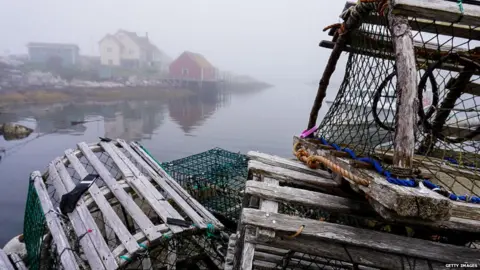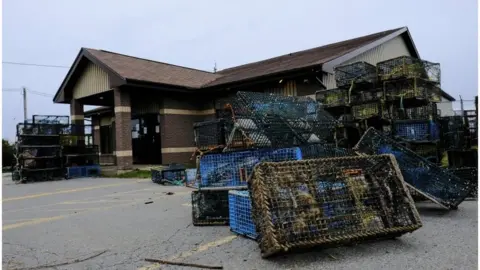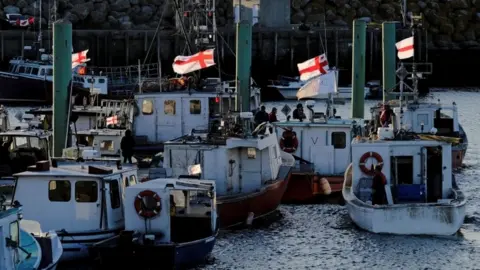Inside Canada's decades-long lobster feud
 Getty Images
Getty ImagesA fight over indigenous fishing rights that's been decades in the making has come to a head in Nova Scotia, the epicentre of Canada's billion-dollar lobster industry.
In a small warehouse on the southern tip of Nova Scotia, near Yarmouth, two indigenous fishermen found themselves trapped with nowhere to go when an angry mob raided the lobster pound where they had stored their catch.
Jason Marr, one of the indigenous fishermen stuck inside, said he had moved his lobster there that evening, because he heard there might be a raid at another location. All was quiet at first, but soon he says he was surrounded by about 200 men.
"They were pounding on the door, screaming obscenities, 'give us the lobster'!" he told the BBC.
There were also four non-indigenous men inside with them, who worked at the pound.
The crowd cut the power and threw a rock through the window, while he called police, he says. Mr Marr says he saw men urinate on his car and slash his tires.
A few hours earlier, a similar raid had been carried out at a lobster pound near New Edinburgh, where a car was burned.
"I didn't know if they wanted to kill me or whatnot... they said they were going to give us until midnight or they were going to burn us out," Mr Marr said.
The standoff ended when police forced him to leave, he says, and he watched as the men stormed the pound and took his catch, as well as others.
Days later, early Saturday morning, the lobster pound burned to the ground in what police are calling a "suspicious" fire.
Mr Marr accused police of standing by and letting the mob take his lobster.
In both raids, police gathered outside but made no arrests on site. The Royal Canadian Mounted Police charged one man on Sunday with burning a car at the lobster pound near New Edinburgh.
Federal Public Safety Minister Bill Blair said more police officers would be sent to the area to "maintain the peace".
This mayhem is the latest in an escalating feud between Mi'kmaq fishermen and non-indigenous commercial fishermen that began when the Sipekne'katik First Nation launched its own fishery in September, during the off-season.
Non-indigenous commercial fishermen say the fishery should be shut down, while indigenous fishermen say it is their constitutional right.
The roots of this discord go back over 250 years to the Peace and Friendship Treaty of 1752, which promised Mi'kmaq the right to hunt and fish their lands and establish trade.
For centuries, the treaty and others like it were ignored.
But in 1999, the Supreme Court of Canada issued a landmark ruling making it clear that the Mi'qmaq and Maliseet people had the right to not just sustain themselves by hunting and fishing, but to earn a "moderate livelihood", even in the off-season.
The court defined "moderate livelihood" as a living that provided for "necessities" like food and shelter, but not the "accumulation of wealth". What that means practically was never addressed in the regulations, leaving a grey area that has yet to be resolved to this day.
For decades, the Mi'kmaq say the government has failed to enforce that ruling. So after several years of failed negotiations, they are coming up with their own solution.
Operating outside of the province's commercial lobster fishery, the Sipekne'katik First Nation plans to make their lobster fishery a test case, issuing just 11 licences, with the hopes of collecting data towards making the operation sustainable in the years to come.
"It wasn't like we just came down and put traps in the water," Chief Michael Sack told the BBC.
But Mr Sack says that shortly after launching the fishery, they became subject to threats and sabotage, which culminated in the raids on two lobster pounds this week. Mr Sack was assaulted last week and a man has been arrested.
Derek Thomas, a commercial fisherman for over 25 years, condemns the violence. But he says the government needs to step in and enforce off-season rules for the sake of the lobster population.
"I don't think anybody likes the violence, and I don't think anybody denies their rights. But enough is enough already," he told the BBC.
"Regulations are designed to prevent over-harvesting and to maintain a sustainable fishery, it is all we want for our communities."
The government does have the right to regulate indigenous fishing in order to protect conservation efforts. But the Supreme Court ruling in the R v Marshall case made it clear that the government must prove the restrictions are necessary.
Mr Thomas says fishermen have "frustration boiling over" after years of deteriorating stocks. Between 2016-2018, lobster caches declined about 4% in the province, although there's no clear indication of why. The pandemic has also cut into lobster exports to the lucrative Chinese market.
This is not the first time indigenous fishermen have clashed with non-indigenous commercial fishers. Shortly after the R v Marshall decision, many indigenous fishermen took to the water in the off-season and fights broke out along wharfs in Quebec, New Brunswick and Nova Scotia.
Like now, the non-indigenous fishermen said they were concerned about the effect that off-season fishing would have on the lobster population.
 Reuters
ReutersIn Canada, the Department of Fisheries and Oceans (DFO) only allows lobster fishing during distinct seasons, timed to coordinate with the lobster's molting schedules, which is when lobsters shed their shell and grow another one.
During the molting, their shells are soft, and they are easily hurt and killed.
But restricting lobster fishing during molting season is not the only way to protect the lobster population, says Robert Steneck, a professor of oceanography who researches lobster populations at the University of Maine's School of Marine Sciences.
"Frankly I don't think it really makes a difference," he says.
The scale of the fishery matters, Mr Steneck says, and the impact that a small fishery like the one organised by the Sipekne'katik First Nation would have limited effect on total populations.
In LFA 34, the regulatory name for the body of water near St Mary's Bay, where the indigenous lobster fishery is located, there are 979 lobster licences, and each licence is allowed to carry about 375-400 traps during the season. The Sipekne'katik fishery has issued 11 licences, with the right to carry 50 traps each.
"Really it would be trivial, in my view, by almost any standard," he says.
In Maine, the lobster capital of the US, there are no seasons, and soft-shelled lobsters are often preferred by diners for their easy-to-crack outer shell and sweeter taste.
Hard-shell lobsters transport better, which means fishermen can sell more of them.
"You do have more mortality of soft-shell lobsters if you're going to use them for distribution - but if it's for domestic consumption it doesn't matter that much," Mr Steneck say.
Canada is the largest supplier of lobsters in the world, and Nova Scotia is responsible for harvesting about half of the country's C$1.4bn of lobster. ($1.05bn; £820m).
The non-indigenous fishing industry has been a vital part of the province's economy since it was settled by British and French colonists in the 1600s.
But the Mi'kmaw have been fishing the region's waters for centuries before.
"We are so deeply connected to the land, the river, the water, the resources. It's not just how we survive; it becomes who we are," says Cheryl Maloney, an activist and political science professor at the University of Cape Breton who is the daughter of former chief Reginald Maloney. Before his death in 2014, her father fought for the community's fishing rights and witnessed the upheaval after R v Marshall.
Between 2000-2007, the government spent C$354m on commercial fishing licences, fishing vessels, gear, and training to give to 32 First Nations that had signed individual agreements with them.
But rather than implement their treaty rights, the agreements simply "cut off a little slice" of the commercial fishery, says indigenous law professor Naiomi Metallic, who teaches at Dalhousie University.
The government promised the agreements would not replace their treaty rights, but negotiations on how to fully implement the Marshall decision have stalled for years, she says.
Meanwhile, DFO continues to fine or arrest indigenous fishermen for fishing in the off-season.
Ms Metallic notes that First Nations in the region have been asking the government to implement their rights for years and Canada has been "dragging its feet".
"Prosecuting people and letting non-indigenous people cut traps and destroy boats - I don't think is a very effective way of addressing the situation," she says.
If there's one thing both sides can agree on, it's that DFO is failing at its job.
The commercial fishers believe DFO has the right to stop fishing in the off-season to protect the lobster stock. The Mi'kmaw believe the government needs to protect their rights and stop the commercial fishermen from sabotaging their traps.
DFO says it is currently in talks with Sipekne'katik First Nation to come to an agreement over the fishery.
"As discussions are ongoing, no further details can be offered at this time," a spokesperson for the DFO told the BBC in a statement.
 Reuters
ReutersThe department currently has negotiated three such agreements with other First Nations, the Elsipogtog and Esgenoôpetitj First Nations in New Brunswick and the Maliseet of Viger First Nation in Quebec. While these agreements give the nations a certain amount of autonomy, ultimately, DFO says that they are responsible for all fishery management in Canada.
Last week, Prime Minister Justin Trudeau urged both sides to keep the peace, but acknowledged the government needed to help resolve the issue fairly.
"Twenty-one years is far too long to wait to see rights recognised," he said.
Meanwhile, the Sipekne'katik have inspired other First Nations to start their own fisheries.
Members of Potlotek First Nation launched their moderate-livelihood fishery on 1 October, which is known as Treaty Day.
And while the Sipekne'katik continue to fish for lobster, they still can't legally sell it, as the province bans people from purchasing lobster from a fisherman without a DFO licence.
"For this to resolve I think the federal government has to try and take this seriously," Ms Metallic says.
